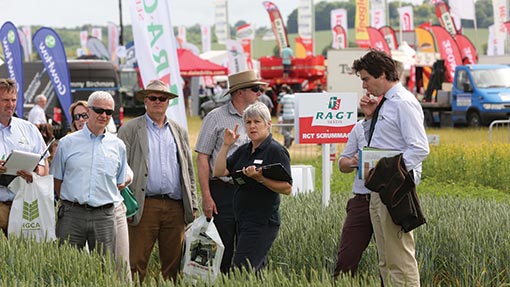Cereals 2014: With agronomy farmers get what they pay for

Agronomists and their customers can boost farm performance by introducing different ways of charging and paying for advice, visitors to Cereals were told.
Partnered by the Oxford Farming Conference, the Arable Conference at this year’s Cereals event brought together experts to discuss whether advice should be free – or whether paying for it gives farmers a competitive edge.
All speakers agreed that good advice should be paid for. But charging for advice should be “much more innovative” than the well-established £/acre method, suggested Patrick Stephenson, chairman of the Association of Independent Crop Consultants.
“Numerous farmers have contract farming agreements. It could be innovative for the agronomy charge to be attached to performance of the contract – as long as it is not detached from the price of the end product, I would be keen on improving the performance of a farm.”
People should consider a broader range of ways of charging for agronomy services, said Mr Stephenson. “There is the opportunity for people out there to look at a much wider scale and how different ideas might be implemented.”
Farmer and Agrii agronomist James Grantham agreed. “Certainly charging per acre is very old school – but a lot of the agricultural industry can be at times,” he said. Taking final gross margin performance into account was certainly something that could be looked at, he added.
“We must think about why we are being employed in the first place. We are giving on-farm advice to help our customers achieve the best results for their businesses, so they can in turn be as profitable as possible.”
Information required from a farm adviser had grown in complexity in recent years, added Mr Grantham. It was the farm adviser’s job to interpret that information and bring it all together into specific farm practices that could be implemented by farmers.
“I’m afraid the days of your traditional spray rep are gone. Much more is asked of us from the industry now.” Customers also received advice on ag-chems, nutrition, varieties, budgeting, input cost management, cultivations, cross-compliance and many environmental issues.
As farming advanced, agricultural techniques were becoming increasingly scientific, said Mr Grantham. Farmers who paid for advice enabled much-needed research and development to take place. “We have to combine science with agronomy to move forward.”
The debate was chaired by Niab chief executive and director Tina Barsby. Other speakers on the panel were Hertfordshire grower and former NFU combinable crops chairman Andrew Watts, and Royal Agricultural Society of England chief executive David Gardner.
It was clear that advice shouldn’t be free, said Mr Gardner. “In my view, in the cereals sector – and the combinable crops sector in particular – farming is becoming more difficult,” he said. “It is becoming more difficult quite fast.
“Throughout most of my career, there has always been a reasonably convenient answer to most of our problems in the chemical shed. That is no longer the case. We have a number of issues facing us relating to the reduction of chemicals.”
In East Anglia alone, challenges included declining soil organic matter across much of the region and a blackgrass menace that was visibly worse every year. Some farmers would have to fundamentally change the way they farmed, said Mr Gardner.
“One of the big challenges that will differentiate successful farmers from unsuccessful farmers – the ones who will have the competitive advantage – is those who are capable of collecting and analysing data,” he explained.
A vast array of new technological sensors was becoming available – allowing farmers to collect information from their farm, analyse it and change farm practices accordingly. The key issue was knowing what information to collect and farmers needed help implementing the technology.
Mr Watts agreed. “Technology moves on, situations change,” he said. “We might know about growing the crops we grow on the farm at the moment, but new crops and opportunities might come along – and with all those things, we have to recognise our limitations.”
Taking the example of hybrid barley, Mr Watts said he was not growing it at the moment because it did not fit his marketing strategy. But if he was to start, he would take some advice, because hybrid barley required a slightly different way of growing a crop.
“Farmers are individuals and people have different strengths and different interests. They focus on different parts of their business. One of my main interests has always been getting out in the field, so that bit isn’t difficult. But other people might be better at financial planning or something else.
“The trick is to ensure that where you bring in outside help – if it is agronomy – to make sure the advice you get is the best or at least commensurate with the way you run your business. If you want to be on the money all the time, you want to make sure your advice fits that picture, too.”

